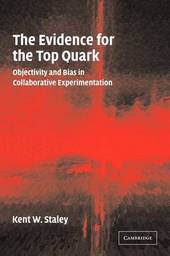
|
The Evidence for the Top Quark: Objectivity and Bias in Collaborative Experimentation
Paperback / softback
Main Details
| Title |
The Evidence for the Top Quark: Objectivity and Bias in Collaborative Experimentation
|
| Authors and Contributors |
By (author) Kent W. Staley
|
| Physical Properties |
| Format:Paperback / softback | | Pages:360 | | Dimensions(mm): Height 229,Width 152 |
|
| Category/Genre | Philosophy of science |
|---|
| ISBN/Barcode |
9780521174251
|
| Classifications | Dewey:539.72167 |
|---|
| Audience | | Professional & Vocational | |
|---|
| Illustrations |
Worked examples or Exercises
|
|
Publishing Details |
| Publisher |
Cambridge University Press
|
| Imprint |
Cambridge University Press
|
| Publication Date |
3 March 2011 |
| Publication Country |
United Kingdom
|
Description
The Evidence for the Top Quark offers both a historical and philosophical perspective on an important recent discovery in particle physics: evidence for the elementary particle known as the top quark. Drawing on published reports, oral histories, and internal documents from the large collaboration that performed the experiment, Kent Staley explores in detail the controversies and politics that surrounded this major scientific result. At the same time the book seeks to defend an objective theory of scientific evidence based on error probabilities. Such a theory provides an illuminating explication of the points of contention in the debate over the evidence for the top quark. Philosophers wishing to defend the objectivity of the results of scientific research must face unflinchingly the realities of scientific practice, and this book attempts to do precisely that.
ReviewsReview of the hardback: '... a significant contribution to the history and philosophy of both experiment and science.' Allen Franklin, University of Colorado at Boulder, author of The Neglect of Experiment Review of the hardback: 'It should become a model of how philosophers do a case study in the history of science ... The philosophy, history and sociology are fully integrated. All in all, it's a wonderful book.' Craig Callender, University of California, San Diego
|